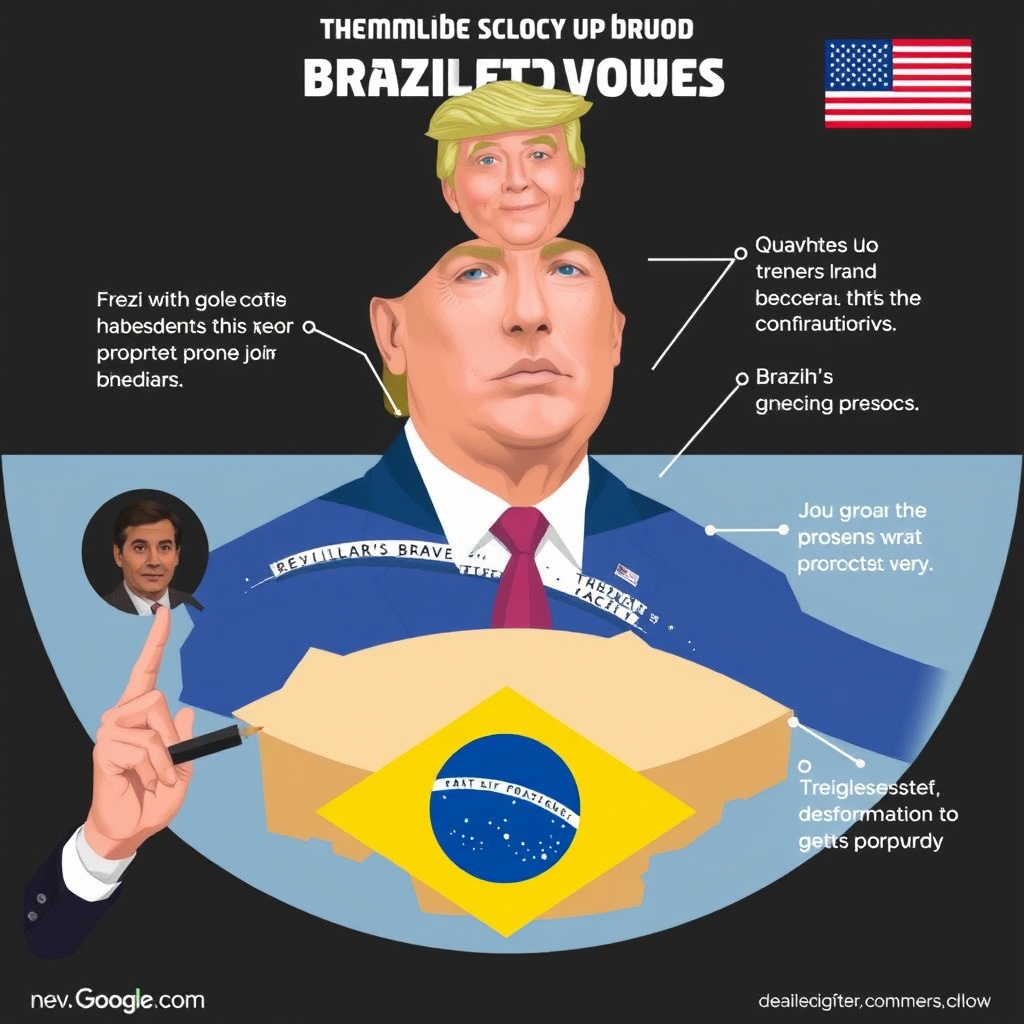Introduction
The trade relationship between Brazil and the United States has been a subject of significant attention in recent years, with both nations engaging in a series of diplomatic and economic maneuvers. In a recent development, Brazil has vowed to match US tariffs after President Trump threatened to impose a 50% levy on certain Brazilian goods. This move is reportedly in response to what Trump describes as the "mistreatment" of his ally, ex-President Jair Bolsonaro. The escalating trade tensions between the two nations have far-reaching implications for the global economy, and it is essential to examine the underlying factors and potential consequences of this trade dispute.
Background and Context
To understand the current trade tensions between Brazil and the US, it is crucial to consider the historical context of their trade relationship. Brazil is one of the largest economies in South America, and the US is its most significant trading partner. The two nations have a long-standing trade agreement, with the US being a major market for Brazilian exports, such as soybeans, iron ore, and coffee. However, the relationship has not been without its challenges. In recent years, the US has imposed tariffs on various Brazilian products, including steel and aluminum, citing national security concerns.
The current trade dispute is also closely tied to the political relationship between the two nations. President Trump has been a vocal supporter of ex-President Jair Bolsonaro, who has been accused of being a populist leader with authoritarian tendencies. Trump's threat to impose a 50% tariff on Brazilian goods is seen by many as a gesture of support for Bolsonaro, who has been facing significant opposition and criticism in Brazil. The move has been met with widespread criticism, with many arguing that it is an attempt to interfere in Brazil's internal affairs and undermine the country's sovereignty.
Economic Implications
The imposition of tariffs on Brazilian goods by the US would have significant economic implications for both nations. Brazil is heavily reliant on exports to the US, and a 50% tariff would make its products less competitive in the US market. This could lead to a decline in Brazilian exports, resulting in significant economic losses for the country. According to a report by the Brazilian Ministry of Economy, a 50% tariff on Brazilian goods could result in a loss of up to $10 billion in exports.
On the other hand, the US would also face significant economic consequences. Brazil is a major supplier of raw materials, such as iron ore and soybeans, which are essential for US industries. A tariff on these products would increase costs for US manufacturers, potentially leading to higher prices for consumers. Additionally, the tariffs could also lead to retaliation from Brazil, which could impose its own tariffs on US goods, further escalating the trade dispute.
Global Trade Implications
The trade dispute between Brazil and the US has far-reaching implications for the global economy. The imposition of tariffs on Brazilian goods could lead to a decline in global trade, as other nations may be deterred from trading with the US due to the uncertainty and unpredictability of its trade policies. This could have significant consequences for the global economy, particularly for developing nations that rely heavily on trade to drive economic growth.
Furthermore, the trade dispute could also lead to a fragmentation of the global trading system, with nations increasingly turning to bilateral and regional trade agreements rather than multilateral agreements. This could undermine the rules-based trading system, which has been instrumental in promoting global trade and economic growth. According to a report by the World Trade Organization (WTO), the increasing use of tariffs and other trade restrictions could lead to a decline in global trade, resulting in significant economic losses for nations around the world.
Case Studies and Examples
There are several case studies and examples that illustrate the potential consequences of the trade dispute between Brazil and the US. For instance, the US-China trade war, which began in 2018, has had significant consequences for both nations. The imposition of tariffs on Chinese goods led to a decline in Chinese exports to the US, resulting in significant economic losses for China. However, the US also faced significant consequences, including higher prices for consumers and a decline in US exports to China.
Another example is the trade dispute between the US and the European Union (EU) over steel and aluminum tariffs. The US imposed tariffs on EU steel and aluminum products, citing national security concerns. The EU responded by imposing its own tariffs on US goods, including whiskey and motorcycles. The trade dispute has had significant consequences for both nations, with the US facing significant losses in its whiskey and motorcycle industries.
Conclusion
In conclusion, the trade dispute between Brazil and the US has significant implications for the global economy. The imposition of tariffs on Brazilian goods by the US could lead to a decline in Brazilian exports, resulting in significant economic losses for the country. The US would also face significant economic consequences, including higher prices for consumers and a decline in US exports to Brazil. The trade dispute could also lead to a fragmentation of the global trading system, undermining the rules-based trading system that has been instrumental in promoting global trade and economic growth.
As the trade dispute between Brazil and the US continues to escalate, it is essential for both nations to engage in diplomatic efforts to resolve the issue. The US should reconsider its decision to impose tariffs on Brazilian goods, and instead, work towards a mutually beneficial trade agreement that promotes economic growth and cooperation between the two nations. The global community should also play a role in promoting a rules-based trading system, encouraging nations to engage in multilateral trade agreements and avoiding the use of tariffs and other trade restrictions. By working together, nations can promote global trade and economic growth, ensuring a more prosperous and stable future for all.


Leave a comment